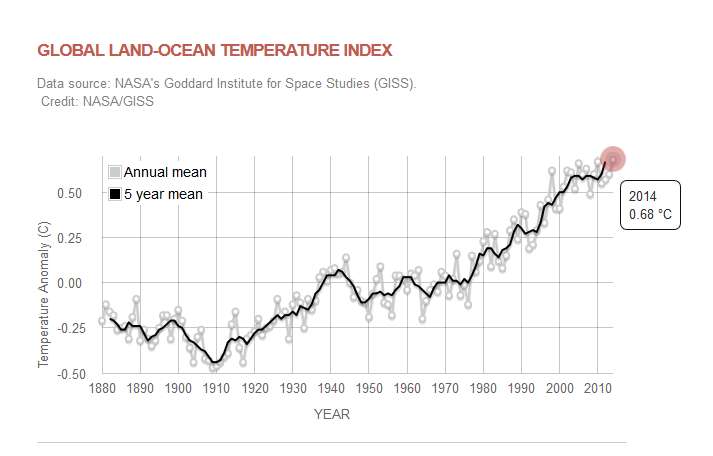October Smashes Temperature Records, Practically Guaranteeing 2015 Will Be Hottest Year Ever
November 18, 2015 by Josh L Davis
The climate records just keep rolling in. Month after month, we keep hitting above-average temperatures, setting new records that are only to be broken yet again further down the line. This October, however, has blasted all**others out of the water. Not only will it pretty much guarantee, with a 99.9 percent probability, that 2015 will be the world’s hottest year ever recorded, but**it was also the first month**to exceed NASA’s average temperature data by more than 1°C (nearly 2°F).
Rather than using pre-industrial levels as a baseline, NASA used an average from between 1951 and 1980 as their starting point, which already includes a certain degree of global warming. Even so, this October smashed that average. In fact, it was so hot, it goes down as the warmest monthever recorded in NASA’s**entire database. This basically makes certain the prediction that 2015 will see average global temperatures breach 1°C of warming since pre-industrial levels.
According to NASA’s data, the global average temperature for October of this year was a shocking 0.2°C (0.36°F) warmer than for the same period last year. All this warming has meant that the last time the world saw a record cold year was in 911. Unfortunately,**13 out of the 15 hottest years on record have all happened since the year 2000. It now seems that rather than slowing down, we’re instead driving full steam ahead to the point at which the planet will no longer be able to recover.
The reason behind these records is depressingly familiar, mainly being down to human-driven climate change. Increases in greenhouse gas emissions are clearly having the predicted effect of warming not just land temperatures, but also the oceans too. Things haven’t been helped by one of the worst El Nino events in recorded history.According to the**World Meteorological Organization, El Nino still has yet to reach its peak, which should be happening over the next few months and could see weather patterns change even more dramatically.
All these records are likely to precede another that the planet will hit next year. It looks likely that atmospheric concentrations of carbon dioxide are going to rise above 400 parts per million, and will probably stay that way for our lifetime, taking decades to start falling again. This not only contributes to the slow cooking of the planet, but also to ocean acidification, preventing molluscs from building their shells. Such temperatures also contribute to the global coral bleaching event currently in progress from Hawaii to the Caribbean.
http://www.iflscience.com/environment/october-smashes-temperature-records-practically-guaranteeing-2015-will-be-hottest-year








